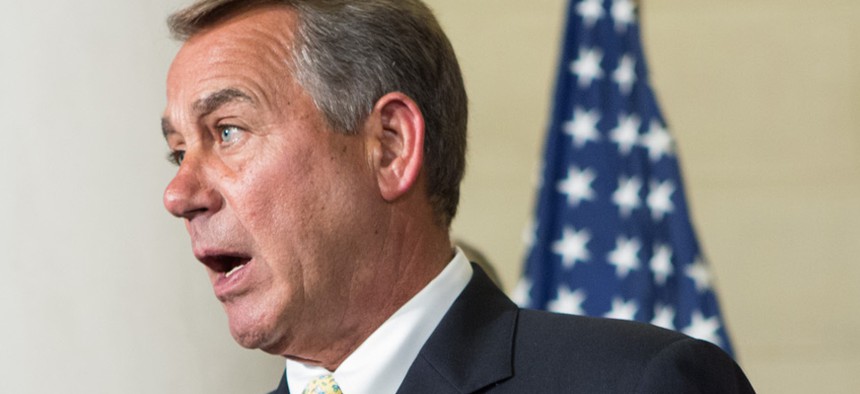
Office of the Speaker of the House
Short-Term Spending Bill Tops House's To Do List Before Recess
Leaders are also hoping for a vote on funding to deal with the flood of unaccompanied minors at the border.
House GOP leaders are pressing to complete a "Big Four" list of items before the House's scheduled August-long adjournment next Thursday.
But looming big is this question: Will their own rank-and-file members cooperate?
Topping this cramped To Do list, senior aides said on Wednesday, is a short-term spending bill to keep government funded and operating at current levels beyond the Oct. 1 start of the new fiscal year—when current funding expires—and likely well beyond Election Day.
First reported Monday by National Journal, the planning for action next week on such a stopgap continuing resolution is seen by GOP leaders as a way to head off any talk over the break of a potential government shutdown—at least any talk that House Republicans should be blamed if that happens.
To date, the House has passed seven of the 12 annual appropriations bills, while the Democratic-led Senate has passed none. And there is little expectation that the two chambers will complete passage of the bills on time.
Also, House leaders are hoping to hold a vote next week on the House GOP's funding and policy response to President Obama's supplemental request for $3.7 billion to deal with the influx of unaccompanied minors to the border, but acknowledge hurdles in its passage.
There is "cautious optimism" that negotiations to reconcile House- and Senate-passed versions of a bill to reform the embattled Veterans Affairs Department can be completed, and a vote on the deal can be held next week. But the confidence is not as high as the hope for this third item, with the costs of those reforms and other details still being hashed out by the conference committee.
A fourth item previously anticipated to be on the floor next week—but since pushed back—was action on a House version to reauthorize the federal Terrorism Risk Insurance Act.
But more certain to happen—rounding out what the senior aides are calling the "Big Four" of items to be addressed before the break—is a House vote to formally authorize Speaker John Boehner to launch a lawsuit challenging Obama's use of executive actions.
Despite these plans, aides said there remained on Wednesday some uncertainty for Boehner and other House leaders regarding votes on a temporary government funding bill and a GOP border plan, and even a VA reform package.
With there still being 10 scheduled legislative days in September before the Oct. 1 start of the new fiscal year, there is concern, but no certainty, that most House Democrats would not go along with passing a continuing resolution.
But there is also worry that few or no Democratic votes—combined with the chance that some House conservatives won't go along with a continuation of existing levels because they want more spending cuts—could leave the CR without enough backing to pass.
This potentiality is being contemplated so quietly that spokesmen for Appropriations Committee Chairman Harold Rogers and Majority Leader-elect Kevin McCarthy were insisting Wednesday that there is no CR, and that none is being planned.
But other senior GOP aides said that is not the case—and that leaders still intend to put one on the floor for a vote next week.
"We'd be crazy not to do so, or all our members are going to hear over the August break is talk of a possibility of a government shutdown," said one senior aide.
Similarly, Republican leaders are looking cautiously to proceeding with floor action on the House's border plan before members begin the recess.
They know that Democratic votes will likely be needed to pass their package, because some of their own Republican members oppose even the $1.5 billion cost of their plan—even though that is less than half of the spending Obama proposed.
But they also know that many Democrats are opposed to at least one major proposed policy change in the emerging GOP package—its call to speed up deportations from the process currently in place under a 2008 law intended to protect children fleeing violence.
Boehner underscored all of this in a letter to Obama on Wednesday, telling the president: "Frankly, it is difficult to see how we can make progress on this issue without strong, public support from the White House for much-needed reforms, including changes to the 2008 law."







